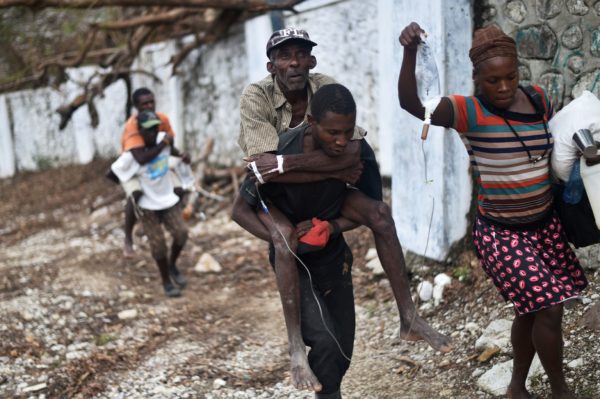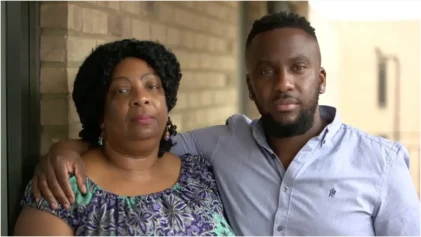It’s been a decade since the first cases of cholera were reported in Haiti, with Oct. 21 marking 10 years since the outbreak was officially announced by government officials.
The bacterial disease spread quickly across the impoverished nation’s mountainous terrain and took root in more rural nether regions.
Within days, the spread became a full-blown epidemic.
Now 10 years later, despite pledging to devote $400 million in aid, the United Nations, critics say, has done little to compensate many of the families impacted by a scourge that’s caused immeasurable losses in the poverty-stricken nation.

“We thankfully are at a point where the epidemic seems like it’s under control. It may be possible to eliminate it,” Beatrice Lindstrom told the Miami Herald. “But when it comes to the lives that were lost, the families that were impacted, we really haven’t seen anything meaningful happen for them.”
Cholera’s brunt over the past decade has been nothing short of catastrophic. More than 10,000 people have died and more than 850,000 people have been infected with the lethal waterborne disease.
According to the Herald, U.N. peacekeepers from Nepal infected an Artibonite River tributary near Mirebalais, a commune about 40 miles northeast of the capital city Port-au-Prince.
After years of denial, the United Nations in 2016 reluctantly admitted to starting the epidemic. It was U.N.’s first public admission of guilt in the ordeal.
“On behalf of the United Nations, I want to say very clearly: we apologize to the Haitian people,” then-U.N. Secretary General Ban Ki-moon said during a December 2016 general assembly in New York. “We simply did not do enough with regard to the cholera outbreak and its spread in Haiti. We are profoundly sorry for our role.”
Ki-moon proposed a two-phase $400-million package to thwart cholera in Haiti by addressing water, sanitation, health systems and increased access to care, according to the U.N. His plan also includes compensation aid for victims of cholera’s grip.
Over three years, the global agency had only raised $20.5 million and doled out $3.2 million in aid for Haitians, according to a group of human rights advocates that made a push for more relief in the wake of the COVID-19 pandemic. These advocates have accused the UN of completing “symbolic development projects” rather than providing meaningful reparations. “Some victims prefer monetary payments, an option that was once on the table, but the UN has foreclosed that possibility seemingly without carrying out consultations or producing a detailed feasibility assessment. Compensation is ordinarily a central component of the right to an effective remedy, and development projects are simply not a replacement for reparations”.
Lindstrom, formerly a legal director for the Institute for Justice and Democracy in Haiti, participated in an Oct. 8 virtual conference entitled “10 Years on Lessons From the Cholera Epidemic in Haiti.”
Other panelists who spoke during the discussion, which was hosted by Harvard Law School’s Human Rights Program, included former U.N. human rights advocates and Josette Sheeran, U.N. special envoy to Haiti.
Sheeran noted that the pledged U.N. funding, which was sanctioned by its general assembly, is considered voluntary charitable donations, and said she has been working hard to secure compensation for victims.
“As you know, the efforts to raise distinct money to fund those efforts have been very difficult and challenging,” she said. “And each area has not been funded at the level it needs to be.
“There have to be mechanisms to respond quickly to something like this, and I think leaving it to voluntary systems can lead to prolonging the suffering and the ability to address things,” Sheeran added.
The Centers for Disease Prevention and Control deemed Haiti’s plague one of the worst cholera outbreaks in recent history. It was the Caribbean nation’s first cholera epidemic in centuries.
Cholera’s onslaught was the second half of a one-two punch that leveled the nation. The epidemic swept through as Haiti was still grappling with the devastation of a 7.0-magnitude earthquake that struck near Port-au-Prince in January 2010. The major quake killed more than 200,000 people and left over 1 million Haitians displaced.
Dr. Louise Ivers, a senior health and policy adviser for Partners In Health, moderated the Oct. 8 virtual conference. During the discussion, she said cholera’s spread was not eradicated until about 21 months ago. She credited the U.N. for helping to stem the tide, but she did not absolve them of their culpability.
“While humanitarian agencies from the U.N. made contributions to responding, the U.N. evaded taking responsibility,” she said. “It took an extraordinary mobilization of victims, civil society, public health experts, human rights organizations and U.N. officials globally to spur a more just U.N. response.”
The Artibonite is the longest river in the country. It spans more than 157 miles snaking through the interior basin of Haiti’s Central Plateau westward all the way to the Dominican Republic border.
An investigation by an independent panel of experts appointed by the U.N. revealed substantial evidence that U.N. soldiers introduced cholera into Haiti by contaminating the major river with sewage leaks from a faulty sanitation center at a U.N.-constructed base, Ivers said.
“It’s a sad memory for sure, but reflecting on the past may enlighten our way to a better future,” said Inobert Pierre, director general of Health Equity International.
Meanwhile, as Haiti struggles with its somber recent history, the United Nations celebrates. The international peacekeeping organization is chartered to deliver humanitarian aid and protect human rights across the globe. On Oct. 24, the U.N. marked its 75-year anniversary of carrying out its mandate.
But Andrew Gilmour, the former U.N. assistant secretary-general for Human Rights, called his ex-employer to the carpet for failing its mission during the cholera epidemic, in a recent interview with the Miami Herald. Gilmour pointed to U.N.’s response in Haiti as the “single greatest example of hypocrisy in our 75-year history” and described it as an “ethical morass.”


